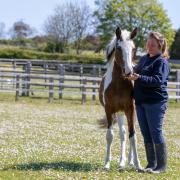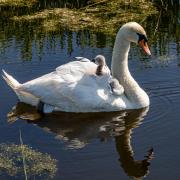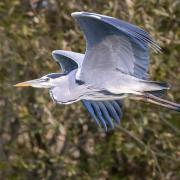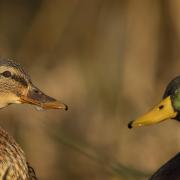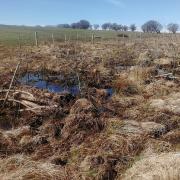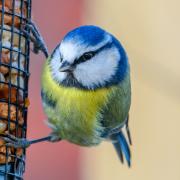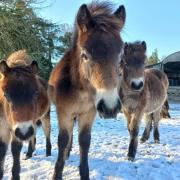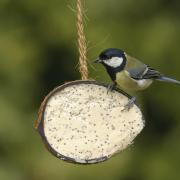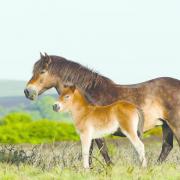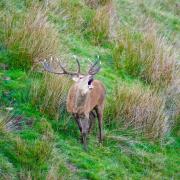Keeper's Cottage in Harridge Woods is now providing refuge to some of Somerset's rare bat species. We find out how this award-winning conservation project is getting on
Sitting derelict for many years, the tumbledown Keeper’s Cottage in Harridge Woods is now providing refuge to some of Somerset’s rare bat species. We find out how this award-winning conservation project is getting on
About three miles from Shepton Mallet is the beautiful nature reserve complex of Harridge Woods, which was bought from the Forestry Commission by the Somerset Wildlife Trust in 1995 with the help of a substantial grant from Heritage Lottery money. And it is here that a batty project to restore a tumbledown cottage in the woods and save rare bats has resulted in Somerset Wildlife Trust volunteers and staff receiving a prestigious national award – the 2009 Biffaward, Natural Environment category. The site is looked after by Adel, Volunteer Reserve Manger since 2005, together with the Somerset Wildlife Trust and the East Mendip Conservation Volunteers led by Jim Rosser, Mick Ridgard and Eve. The bat house was once the gamekeeper’s cottage, built by agricultural reformist John Billingsley, whose family held the Ashwick Grove Estate in the late 18th century. The mansion house was a mile further up the valley and is now in ruins. In former days, Keeper’s Cottage would have looked rather grand, with gothic arched windows, and was certainly built to impress. When the Somerset Wildlife Trust was approached to buy it in 2006 it was derelict and home to many bats, which were extremely vulnerable as the roof and windows had disappeared in the ’70s, after the last tenants moved out. To get the cottage ship-shape for the bats to move into, the walls were re-pointed and chimneys capped off to provide roosting sites, and all the doors and windows were fitted with grills to prevent curious visitors from disturbing the bats. Volunteers cleared debris from the tumbledown structure, enabling a new floor and bat loft to be built above the old washhouse. A recycled staircase was installed to gain access for monitoring, and roosting niches added to an upstairs cupboard. As a builder and carpenter, Phil Dampier is a key volunteer. He said: “I have thoroughly enjoyed working on Keeper’s Cottage. It has been very rewarding working for the benefit of the bats, especially as they used the new loft immediately after it was finished!”Adel became Volunteer Reserve Manger in 2005 and now regularly conducts guided walks around the woodland. As well as monitoring the bats, she also monitors the site for other important wildlife including the hazel dormouse. A licensed bat warden, Adel monitors the bats by checking the cottage regularly and using a bat detector to listen for bats’ social echo-location calls. The cottage is vital for all six species of bat, but especially the very rare greater horseshoe. It is thought there are as few as 5,000 of these bats left in the UK. They are restricted to the South West, and intensive farming, use of pesticides and the loss of roosts in buildings have all added to their decline. Keeper’s Cottage is an ideal roosting site as it is near the bats’ woodland hunting ground and near the limestone caves used for winter hibernation. At night-time bats use the sheltered cottage to hang upside-down to digest their food, before leaving at dawn to feed again and then returning to the roost. It is hoped Keeper’s Cottage will be used for mating by lesser and greater horseshoe bats, thus helping to secure the population for the future. Volunteer Edward Wells of the Somerset Bat Group said: “We are extremely pleased with the results of the bat project in Harridge Woods. It is an excellent example of all agencies working together to better provide for the needs of these endangered animals and we look forward to further monitoring to record the success of the bat house.” The Biffaward prize money – a cheque for �2,000 – comes as a welcome addition to the �17,383 grant from Biffaward they received to save the ruined cottage from dereliction. The volunteers are working on the roof of the riverside cellar room, which leaks rainwater through the floor of the cottage and onto the cellar room below, dissolving the ceiling mortar. The bats have avoided this area for roosting as it is too wet. Adel added: “The funding boost is helping us continue our work and provide a safe haven for the bats for years to come. We owe a lot to Biffaward and were honoured to accept the award.” Biffaward is managed by the Royal Society of Wildlife Trusts (RSWT), which utilises landfill tax credits donated by Biffa Waste Services. The project would not have been possible without the support of the Trust’s volunteers and special thanks go to Philip Dampier for his excellent guttering and Tony House for providing the steels, scaffold and advice. Special thanks also go to David Cottle and Edward Wells, from the Somerset Bat Group, for their input in design ideas for the bat loft, and to Rob Turner and Neil Watson, the past and present East Mendip Reserves Officers with Somerset Wildlife Trust, and Andrew Warren, estate worker.
To keep in touch with the project or get involved with any further works to Keeper’s Cottage, e-mail Adel Avery (adel@nettlebride.com) or Mick Ridgard (Mridgard@aol.com). For more information about Somerset Wildlife Trust visit http://www.somersetwildlife.org.uk/. For enquiries about bats, or if you think you may have bats roosting in your property, contact the Bat Conservation Trust, e-mail enquiries@bats.org.uk, call the National Bat Helpline on 0845 1300 228, or visit http://www.bats.org.uk/.
Inspire our next generation about wildlife The Somerset Wildlife Trust is looking for volunteers to help lead its Wildlife Watch groups at Chancellors Farm near Cheddar and Fyne Court near Taunton in Somerset. Wildlife Watch is the junior branch of the Wildlife Trusts. You do not need to be a qualified teacher or a wildlife expert as training and support will be provided. You will need to be able to commit to each monthly Watch session as well as some time each month for preparation. Volunteers will need to undergo a Criminal Records Bureau check.If you would like to find out more, please contact Jessy Harris on 01823 652415 or e-mail jessy.harris@somersetwildlife.org.





